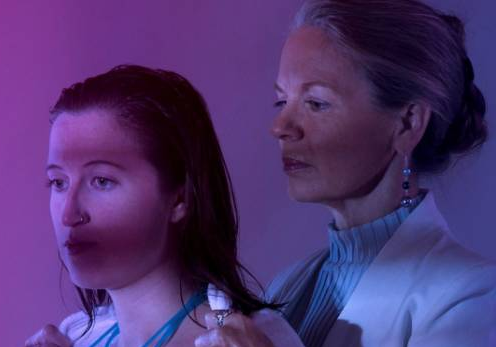Hilary Penwarden
Following the opening sequence, the fraught relationships between the three women on stage are explained through impassioned deliveries of text, mostly in the form of direct address monologues to the audience. There are few verbal exchanges between the characters themselves. Daughter Anna (played by Meron McCardle) is at the centre of obsessive attention from the other two female characters. She tells us about her gruelling training regimes as a competitive swimmer, her secret desire for Tabatha (Anastasia Davis) and Tabatha’s desire for her, and the unimaginable pressures she faces from her mother (Kassie McLuskie). We learn from the mother that she herself wanted to be a competitive swimmer in her youth and now treats her daughter as her “mirror”, pressuring her to be what she could not be saying she is “... in love with how similar [Anna is] to how I used to be.” Tabatha’s feelings too are worn on her sleeve as she tells us she is unable to get Anna out of her heart (“her green eyes won’t let me”). The language is deliciously over the top, as you’d expect from a teen rebellion story.
The emotive language of all three characters is paired with emotive physical and vocal expression. The director has pushed these actors to deliver their lines with passionate abandon, leaving no room for subtlety in their performances. This approach means there are frequent double percussive moments that prevent me from connecting with the action. Dramatic lines like “Did you even come out of me?” and “I won’t give up on your heart” are expressed in between gasping breaths with balled fists and scrunched up faces at a volume that is either loud or extremely loud (shouting). Not only does this make me concerned for the performers’ vocal chords, it gets tiresome to listen to and watch very quickly. Without any quiet or subtle moments, the noisy high intensity is unearned and loses impact.
The delivery style prevents comprehension of finer details in the text like poetry and plot. Tabatha describes her first intimate encounter with Anna as “submerging into the deep blue of our bodies” and the two lovers compare themselves to “flapping swordfishes”. While I relish the poetry of these lines, much of it is lost because the performers are straining themselves vocally and we struggle to discern what they are saying. For the same reason, important plot details are lost on me. I can’t be certain from the intermittent dialogue that I do absorb what actions the characters are taking, what is happening in the characters’ present and what is a recollection from their past. The experience leaves me feeling frustrated and out of the loop.
The continuous high-intensity performance style is matched with an unrelenting soundscape. The electronic music we heard at the beginning is a constant throughout the show. There's only a single break for a few moments during a transition, where a recorded weather forecast is played. The music is beautiful and eerie and impressive, but distracting at times. It creates such a distinct and overbearing tone that the actors have no freedom to play anything nuanced over top of it. Again, allowing room for quieter or silent moments would make the work put into the soundtrack better able to be appreciated. The combination of a dominating soundscape and overwrought performance styles gives the play an energised beginning but their relentless use is too exhausting to keep the audience’s attention.
I’m glad the makers have chosen to be bold and unsubtle. The problem is that none of the big bold moments are earned because they are the entire play. We’re thrown right into the middle of a dramatic climax without getting to see any lead-up or witness the consequences. When the whole play is a 60-minute climax, there’s actually no climax at all. It’s a real shame because I would have loved to hear more of the beautiful poetic language in the text, to be affected by the dramatic music that has been painstakingly composed and to really feel alongside the impassioned performers. The Swimmer makes some exhilarating and daring choices with design, language and acting. However, without any variation in tone or intensity, these choices cannot live up to their potential.






